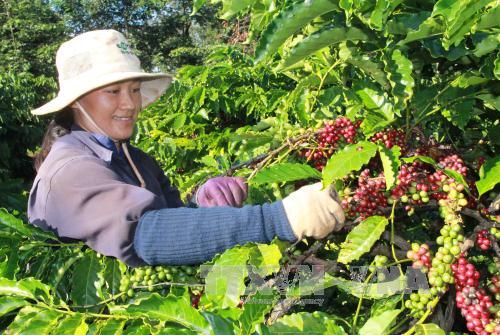 Economy
Economy

Việt Nam wants to promote co-operation in production and consumption of tea and coffee with China, said Minister of Agriculture and Rural Development (MARD) Nguyễn Xuân Cường at forum held in Hà Nội on Monday.

|
| A woman harvests coffee in the Tây Nguyên (Central Highlands) province of Đắk Lắk. — VNA/VNS Photo Phạm Cường |
HÀ NỘI — Việt Nam wants to promote co-operation in production and consumption of tea and coffee with China, said Minister of Agriculture and Rural Development (MARD) Nguyễn Xuân Cường at forum held in Hà Nội on Monday.
The forum, attended by Chinese Minister of Agriculture Han Changfu, Government officials and representatives of businesses of the two countries, aimed to boost consumption, helping businesses strengthen connection in production and supplying raw materials for processing.
Cường said Việt Nam and China are the two major agricultural product exporters. “The two sides have similar culture of enjoying tea and coffee, so it’s a great opportunity for businesses to co-operate in production, processing and trading of tea and coffee, not only serving people of the two countries but also exporting to the global market with a population of 7.7 billion people.”
"China is a big importer of Vietnamese agricultural products, however, the potential is very large, so it’s necessary to increase the supply of agricultural products for the global agricultural chain," Cường said.
Cường said China is also a nation progressing in science and technology, especially in regard to seedlings. “The two sides need to further co-operate in this field, as well as dealing with climate change, natural disasters and agricultural product processing.”
Chinese Minister of Agriculture Han Changfu said tea has become a valuable asset. China and Việt Nam are countries with a tradition of growing tea in large volumes.
“We play important roles in the world tea market and China is a big market for Việt Nam's tea exports. Tea and coffee of Việt Nam hold an important position in the Chinese market,” Han said.
“Many Vietnamese giants such as Vinacoffee have been well received by Chinese people. I hope there will be large market for Việt Nam's tea and coffee industry in China,” he added.
Nguyễn Thiết Cương, deputy director of the Minh Tiến Coffee Import Export Co., Ltd, said people only think about coffee drinks, but in fact the nature of coffee trees can offer a lot of products.
“It's necessary to find processing methods to gain higher value from coffee trees, in which technology is the most important thing. Processing technology must be improved and innovated to exploit the value of coffee,” Cương said.
A MARD report shows that Việt Nam’s tea growing area was about 125,000ha with a capacity of nearly 90 tonnes per hectare and output of more than one million tonnes of fresh buds. Up to now, it can produce various kinds of tea to serve the diverse consumption needs of customers around the world.
Việt Nam's tea products have been exported to 61 countries and territories, ranking fifth in the world in terms of export value and second in terms of output.
In 2018, the country's tea export volume reached 128,000 tonnes, worth US$219 million.
As for coffee, the country has 688,400ha of coffee in 2018, up 30 per cent compared with 2008, marking an output of nearly 1.62 million tonnes.
Việt Nam has exported coffee to more than 80 countries and territories, ranking second in the world and first in term of Robusta coffee exportation. Last year, the country earned $3.5 billion from export of 1.88 million tonnes, up 20 per cent in volume compared with 2017. — VNS